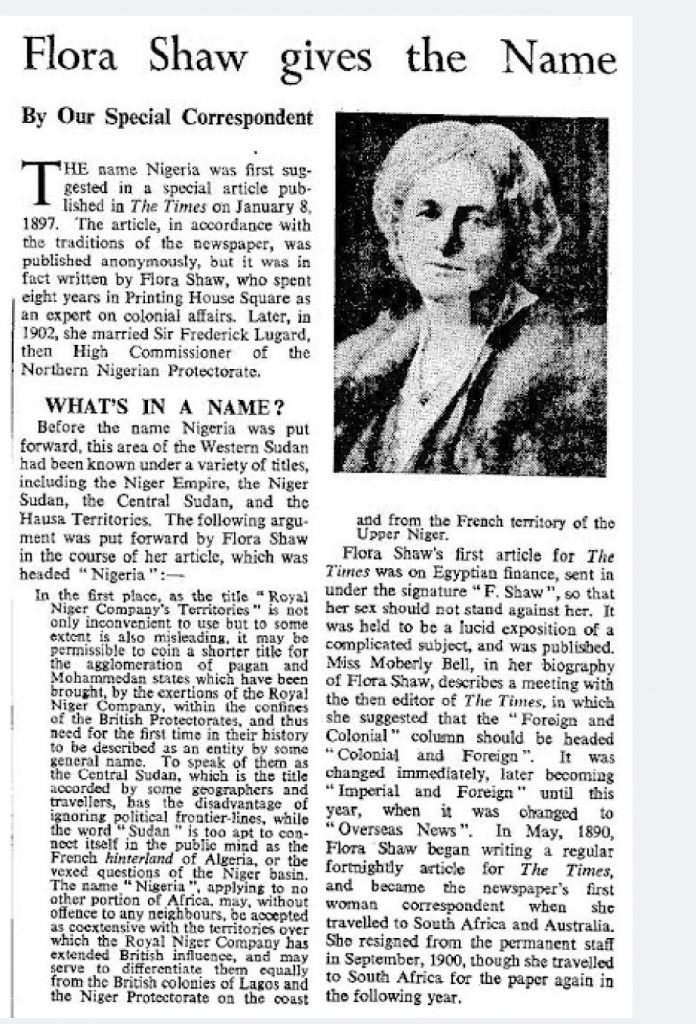A name is a powerful thing, like a passport that travels with us. Even though the sound of our name rolls off our tongues with ease and familiarity, we rarely examine how our names help to define our identity. My middle name has always fascinated me. However, walking around with a name that seemed familiar but lost in meaning to me made me feel vulnerable. Since discovering its meaning, I have tried to embody its meaning. The name is the shortest origin story. It speaks to our roots, where we have been and where we are heading. In essence, it serves as a link between the past, the present, and the future.
A fragment of Nigeria’s story is summed up in the name. It is an encapsulation of our history and like so many modern African countries, Nigeria is the product of European imperialism. Interestingly, the name Nigeria – derived from the Niger River, the country’s dominant geographical feature – was suggested in the 1890s by Flora Shaw, a British journalist who later married Frederick Lugard. Prior to the name ‘Nigeria’ emerging, the British had taken control of Lagos and the Southern Coast. The Royal Niger Company controlled the region around the Niger River, which was known as the Royal Niger Company Territories. In a famous article, Flora Shaw suggested the name ‘Nigeria’ to describe the region held by the Niger Royal Company Territories and the Southern Protectorate. It was only afterwards when the British, under Frederick Lugard, conquered Sokoto and Kano, that Nigeria was applied to the Northern region.
In recent times, there have been speculations about where the name Nigeria truly came from. Natasha H. Akpoti in a personal reflection wrote on the history of Nigeria, particularly how our country came to be named. This story trended on social media platforms. She started her essay by recollecting an airplane conversation she had with an unnamed “American professor of African history” who persuaded her to believe that contrary to what she had been taught, Flora Shaw, Frederick Lugard’s girlfriend and later wife, who came up with the name of our country, didn’t invent the name “Nigeria” from River Niger. The professor told her that Nigeria simply means ‘The Nigger Area’ or ‘Land of the Black slaves.’ “Nigger” was a common derogatory slang used for slaves. This claim has been deemed almost wholly historically inaccurate by scholars.
Pan-Atlantic University’s The Centenary Project, which was launched in 2014, published a scanned newspaper clipping of a January 8, 1897 article titled “Flora Shaw Gives the Name” in The Times of London where Flora Shaw first suggested Nigeria’s name. Shaw’s original article was titled “Nigeria.” The article did not allude to the speculation that Nigeria simply means ‘The Nigger Area’ or ‘Land of the Black slaves.’

The problem of Nigeria is not the name but the people. Changing a name will not distort the fact that we were indeed colonised, it also will not force us into unity. I suppose a name change would have been welcomed if the country wasn’t so unstable. Changing a name to the United African Republic will not hide the fact that Nigeria is indeed a nation struggling with the chains of fragmentation. In fact, it would be ironic if we had ‘united’ in our name but were still defined by ethnic sentimentalism and religious intolerance. What is in a name? Everything. But what if the name is not the pressing issue? Nigeria’s disunity is made up of a complex combination of factors, such as religion, culture, more recently, the Islamist militant Boko Haram insurgency. Nigeria needs a systematic change, a structural change and a name change is the least of our problems now. A name change is a surface-level solution to Nigeria’s deep-seated problems.
Every day, news reports in Nigeria’s newspapers detail increasing levels of kidnappings, ransom demands, banditry, police brutality, religious intolerance and more. There is tension between the regions. The call for secession has grown louder. The Indigenous People of Biafra (IPOB), a radical breakaway faction of the Movement for the Actualization of the Sovereign State of Biafra (MASSOB) advocates secession and the restoration of an independent Biafra nation in the mainly Igbo-speaking south-east region. There is also a secessionist movement in the west – the Oodua Republic Movement. Boko Haram, which has terrorised the northeastern part of Nigeria for more than a decade with aims to create an Islamic State in the territory of Nigeria, is another secessionist group. Rather than design and promulgate policies to arrest the deterioration, a name change is proposed.
While I am of the stand that it’s high time we shrug off our colonised coat and reinvent ourselves as a people unaffected by European imperialism, the Nigerian government must make a stronger case for unity. There is power in a name. However, I am sceptical that the name, “United African Republic” will hold much power in the grand scheme of things in our country. It may look good on paper, but it could not be more ironic.